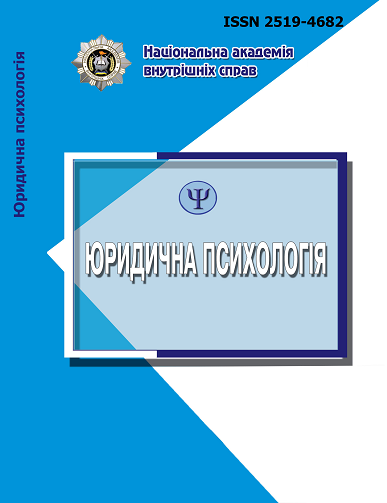Trust as the Basic Principle оf Interaction of National Police of Ukraine with the Population
Keywords:
National Police of Ukraine, police reform, trust, partnership
Abstract
The article is devoted to the question of trust as the fundamental principle of interaction between the National Police of Ukraine and the population. The modern concept of the development of the National Police of Ukraine involves the formation of partnerships, trusting relations between the police and citizens, establishing communication and dialogue between them. The successful functioning of the police institution itself within the framework of legal protection of citizens, as well as the level of interaction between the public and the law enforcement agencies will depend on the extent to which citizens will trust the National Police of Ukraine. After analyzing the views of scholars and politicians on the development of partnerships between the police and the public, it can be argued that a colossal trust credit, which a new police force still has, needs to be saved and used for further reforms. We need a police force where the policeman is responsible – in contrast to his predecessors, with impunity for policemen. We need a police force that within itself (and ideally within each police officer) contains a mechanism that keeps a law violation that does not require external control of the prosecutor’s office, which is able to force itself to act solely by law. But this must be actions, first of all, from the legislative power of Ukraine, and not empty sentences and promises. The article emphasizes that trust is one of the fundamental foundations of a partnership with citizens, which, on the one hand, will increase the effectiveness of police performance of their duties, and, on the other, a sense of protection of citizens. When determining the readiness of citizens to interact with the police, trust is not the only factor that affects citizens’ readiness to interact with police officers. Interaction involves the existence of a common and significant goal for the subjects of interaction. The common goal unites people, creates in them a sense of belonging to a particular community. When the level of trust between citizens and the police will be appropriate, this will facilitate the formation of partnerships between them. Trust is necessary and possible to win. Its formation requires a long and positive history of cooperation and agreement between the National Police of Ukraine and the community. For this, ethical levers and cooperation with the media should be involved, which in turn will contribute to the formation of a positive opinion on the work of the police, ensuring public and personal safety of citizens, preventing offenses, solving and investigating crimes, and establishing partnership between employees of the National Police of Ukraine and the population.Downloads
Download data is not yet available.
Abstract views: 236 PDF Downloads: 530
Issue
Section
Psychological support of law enforcement
- Authors reserve the right to authorship of their own work and transfer to the magazine the right of the first publication of this work under the terms of the Creative Commons Attribution License, which allows other persons to freely distribute published work with mandatory reference to authors of the original work and the first publication of an article in this magazine.
- Authors have the right to enter into separate additional agreements on non-exclusive dissemination of the work in the form in which it was published in the journal (for example, to post an article in the institution's repository or to publish as part of a monograph), provided that the link to the first publication of the work in this journal is maintained.
- The journal's policy allows and encourages the posting of articles by authors on the Internet (for example, in electronic storehouses of institutions or on personal websites), both before the submission of this manuscript to the editorial office and during its editorial processing, as this contributes to the creation of a productive scientific discussion and positively affects the efficiency and dynamics of citing the published work.




